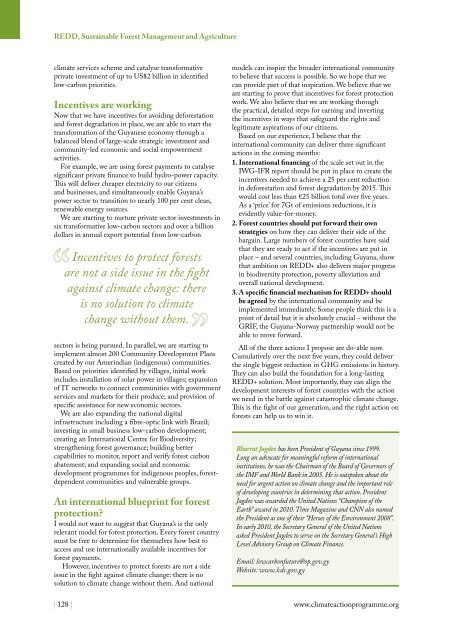Climate Action 2010-2011
You also want an ePaper? Increase the reach of your titles
YUMPU automatically turns print PDFs into web optimized ePapers that Google loves.
Redd, Sustainable Forest Management and Agriculture<br />
climate services scheme and catalyse transformative<br />
private investment of up to US$2 billion in identified<br />
low-carbon priorities.<br />
Incentives are working<br />
Now that we have incentives for avoiding deforestation<br />
and forest degradation in place, we are able to start the<br />
transformation of the Guyanese economy through a<br />
balanced blend of large-scale strategic investment and<br />
community-led economic and social empowerment<br />
activities.<br />
For example, we are using forest payments to catalyse<br />
significant private finance to build hydro-power capacity.<br />
This will deliver cheaper electricity to our citizens<br />
and businesses, and simultaneously enable Guyana’s<br />
power sector to transition to nearly 100 per cent clean,<br />
renewable energy sources.<br />
We are starting to nurture private sector investments in<br />
six transformative low-carbon sectors and over a billion<br />
dollars in annual export potential from low-carbon<br />
Incentives to protect forests<br />
are not a side issue in the fight<br />
against climate change: there<br />
is no solution to climate<br />
change without them.<br />
sectors is being pursued. In parallel, we are starting to<br />
implement almost 200 Community Development Plans<br />
created by our Amerindian (indigenous) communities.<br />
Based on priorities identified by villages, initial work<br />
includes installation of solar power in villages; expansion<br />
of IT networks to connect communities with government<br />
services and markets for their produce; and provision of<br />
specific assistance for new economic sectors.<br />
We are also expanding the national digital<br />
infrastructure including a fibre-optic link with Brazil;<br />
investing in small business low-carbon development;<br />
creating an International Centre for Biodiversity;<br />
strengthening forest governance; building better<br />
capabilities to monitor, report and verify forest carbon<br />
abatement; and expanding social and economic<br />
development programmes for indigenous peoples, forestdependent<br />
communities and vulnerable groups.<br />
An international blueprint for forest<br />
protection?<br />
I would not want to suggest that Guyana’s is the only<br />
relevant model for forest protection. Every forest country<br />
must be free to determine for themselves how best to<br />
access and use internationally available incentives for<br />
forest payments.<br />
However, incentives to protect forests are not a side<br />
issue in the fight against climate change: there is no<br />
solution to climate change without them. And national<br />
| 128 |<br />
models can inspire the broader international community<br />
to believe that success is possible. So we hope that we<br />
can provide part of that inspiration. We believe that we<br />
are starting to prove that incentives for forest protection<br />
work. We also believe that we are working through<br />
the practical, detailed steps for earning and investing<br />
the incentives in ways that safeguard the rights and<br />
legitimate aspirations of our citizens.<br />
Based on our experience, I believe that the<br />
international community can deliver three significant<br />
actions in the coming months:<br />
1. International financing of the scale set out in the<br />
IWG-IFR report should be put in place to create the<br />
incentives needed to achieve a 25 per cent reduction<br />
in deforestation and forest degradation by 2015. This<br />
would cost less than €25 billion total over five years.<br />
As a ‘price’ for 7Gt of emissions reductions, it is<br />
evidently value-for-money.<br />
2. Forest countries should put forward their own<br />
strategies on how they can deliver their side of the<br />
bargain. Large numbers of forest countries have said<br />
that they are ready to act if the incentives are put in<br />
place – and several countries, including Guyana, show<br />
that ambition on REDD+ also delivers major progress<br />
in biodiversity protection, poverty alleviation and<br />
overall national development.<br />
3. A specific financial mechanism for Redd+ should<br />
be agreed by the international community and be<br />
implemented immediately. Some people think this is a<br />
point of detail but it is absolutely crucial – without the<br />
GRIF, the Guyana-Norway partnership would not be<br />
able to move forward.<br />
All of the three actions I propose are do-able now.<br />
Cumulatively over the next five years, they could deliver<br />
the single biggest reduction in GHG emissions in history.<br />
They can also build the foundation for a long-lasting<br />
REDD+ solution. Most importantly, they can align the<br />
development interests of forest countries with the action<br />
we need in the battle against catastrophic climate change.<br />
This is the fight of our generation, and the right action on<br />
forests can help us to win it.<br />
Bharrat Jagdeo has been President of Guyana since 1999.<br />
Long an advocate for meaningful reform of international<br />
institutions, he was the Chairman of the Board of Governors of<br />
the IMF and World Bank in 2005. He is outspoken about the<br />
need for urgent action on climate change and the important role<br />
of developing countries in determining that action. President<br />
Jagdeo was awarded the United Nations “Champion of the<br />
Earth” award in <strong>2010</strong>. Time Magazine and CNN also named<br />
the President as one of their “Heroes of the Environment 2008”.<br />
In early <strong>2010</strong>, the Secretary General of the United Nations<br />
asked President Jagdeo to serve on the Secretary General’s High<br />
Level Advisory Group on <strong>Climate</strong> Finance.<br />
Email: lowcarbonfuture@op.gov.gy<br />
Website: www.lcds.gov.gy<br />
www.climateactionprogramme.org












